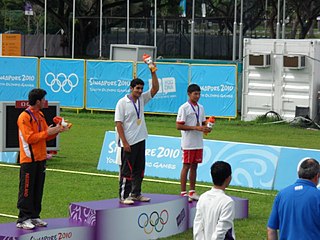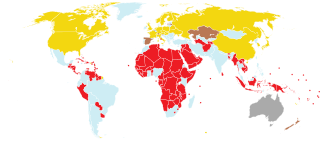
The 1936 Summer Olympics, officially known as the Games of the XI Olympiad, was an international multi-sport event held in Berlin, Germany, from 1 August to 16 August.
The 1932 Summer Olympics, officially known as the Games of the X Olympiad, was an international multi-sport event held in Los Angeles, California, United States, from July 30 to August 14.
The 1994 Winter Olympics, officially known as the XVII Winter Olympics, were a winter multi-sport event held in Lillehammer, Norway, from February 12 to February 27, 1994. A total of 1,737 athletes representing 67 National Olympic Committees (NOCs) participated in 61 events, from 12 sports and disciplines. These were the only Winter Olympics held two years after the prior Games, as opposed to the four year separation before and after. Continuing the break from tradition of 1992, the medals were primarily made of granite rather than metal; gold, silver, or bronze was used only on the border, the Olympic rings, and a pictogram of the sport for which the medal was awarded.
The 1988 Winter Olympics, officially known as the XV Olympic Winter Games, was a winter multi-sport event held in Calgary, Canada, from 13 to 28 February 1988. A total of 1,423 athletes representing 57 National Olympic Committees (NOCs) participated in 46 events from 10 different sports and disciplines. Five new events were contested at these Games—men's and women's Super G in alpine skiing, team events in Nordic combined and ski jumping, and women's 5000 metres in speed skating—and two events returned to the program—men's and women's combined in alpine skiing.
The 1968 Winter Olympics, officially known as the X Olympic Winter Games, was a winter multi-sport event held in Grenoble, France, from 6 to 18 February 1968. A total of 1,158 athletes representing 37 National Olympic Committees (NOCs)—including Morocco's first delegation—participated in 35 events from 10 different sports and disciplines. The team relay (4 × 7.5 km) event in biathlon was contested for the first time.

The all-time medal table for all Olympic Games from 1896 to 2022, including Summer Olympic Games, Winter Olympic Games, and a combined total of both, is tabulated below. These Olympic medal counts do not include the 1906 Intercalated Games which are no longer recognized by the International Olympic Committee (IOC) as official Games. The IOC itself does not publish all-time tables, and publishes unofficial tables only per single Games. This table was thus compiled by adding up single entries from the IOC database.

The 2006 Winter Olympics, officially known as the XX Olympic Winter Games, was a winter multi-sport event held in Turin, Italy, from February 10 to February 26, 2006. A total of 2,508 athletes representing 80 National Olympic Committees (NOCs) participated in 84 events from 15 different sports and disciplines.

The 2012 Winter Youth Olympic Games, officially known as the I Winter Youth Olympic Games (YOG), were an international multi-sport event for youths that took place in Innsbruck, Austria, on 13–22 January 2012. They were the inaugural Winter Youth Olympics, a major sports and cultural festival celebrated in the tradition of the Olympic Games. Approximately 1100 athletes from 70 countries competed. The decision for Innsbruck to host the Games was announced on 12 December 2008 after mail voting by 105 International Olympic Committee (IOC) members. Innsbruck is the first city to host three winter Olympic events, having previously hosted the 1964 Winter Olympics and the 1976 Winter Olympics.

The 2014 Summer Youth Olympics, officially known as the II Summer Youth Olympic Games Chinese: 第二届夏季青年奧林匹克运动会; pinyin: Dì'èrjiè Xiàjì Qīngnián Àolínpǐkè Yùndònghuì, and commonly known as Nanjing 2014, were the second Summer Youth Olympic Games, an international sports, education and cultural festival for teenagers, held from 16 to 28 August 2014 in Nanjing, China. These were the first Youth Olympic Games held in China, making it the first country to host both regular and Youth Olympics following the 2008 Summer Olympics in Beijing.

The 2016 Winter Youth Olympics, officially known as the II Winter Youth Olympic Games, took place in and around Lillehammer, Norway, between 12 February and 21 February 2016. They were the fourth Youth Olympic Games and the second winter edition. Lillehammer was awarded the games on 7 December 2011 as the only candidate. The games reused venues from the 1994 Winter Olympics; this made Lillehammer the first city to host both regular and Youth Olympics. In addition to Lillehammer, sports were contested in Hamar, Gjøvik and Øyer.

The 2010 Winter Olympics, officially known as the XXI Olympic Winter Games, was a winter multi-sport event held in Vancouver, British Columbia, Canada, from February 12 to February 28. A total of 2,632 athletes representing 82 National Olympic Committees (NOCs) participated in 86 events from 15 different sports and disciplines.

The 2010 Summer Youth Olympics, officially known as the Singapore 2010 Youth Olympic Games (YOG), were an international multi-sport event held in Singapore from 14 to 26 August 2010. The event was the inaugural Youth Olympic Games, and it saw 3,531 athletes between 14 and 18 years of age competing in 201 events in 26 sports. This medal table ranks the 204 participating National Olympic Committees (NOCs) by the number of gold medals won by their athletes. The Kuwait Olympic Committee was suspended by the International Olympic Committee (IOC) prior to the Games, but Kuwaiti athletes were allowed to participate and the country is listed in the table, bearing the Olympic flag.
The 2012 Winter Youth Olympics medal table is a list of National Olympic Committees (NOCs) ranked by the number of gold medals won by their athletes during the 2012 Winter Youth Olympics, held in Innsbruck, Austria, from January 13 to January 22, 2012. Approximately 1,059 athletes from 70 NOCs participated in 63 events in 15 sports.

Teams made up of athletes representing different National Olympic Committees (NOCs), called mixed-NOCs teams, participated in the 2012 Winter Youth Olympics. These teams participated in events composed entirely of mixed-NOCs teams. When a mixed-NOCs team won a medal, the Olympic flag was raised rather than a national flag; when a mixed-NOCs team won gold, the Olympic anthem would be played instead of national anthems.
The 2014 Summer Youth Olympics medal table is a list of National Olympic Committees (NOCs) ranked by the number of gold medals won by their athletes during the 2014 Summer Youth Olympics, held in Nanjing, China, from 17 to 27 August 2014.

Curling at the 2016 Winter Youth Olympics was contested at the Kristins Hall in Lillehammer, Norway from 12 to 21 February. The mixed team event took place from 12 to 17 February, while the mixed doubles tournament took place from 19 to 21 February.

Teams made up of athletes representing different National Olympic Committees (NOCs), called mixed-NOCs teams, participated in the 2016 Winter Youth Olympics. These teams participated in either events composed entirely of mixed-NOCs teams, or in events which saw the participation of mixed-NOCs teams and non-mixed-NOCs teams. When a mixed-NOCs team won a medal, the Olympic flag was raised rather than a national flag; if a mixed-NOCs team won gold, the Olympic anthem would be played instead of national anthems. A total of 6 events with Mixed NOCs were held.

The 2018 Winter Olympics medal table is a list of National Olympic Committees ranked by the number of medals won during the 2018 Winter Olympics, held in Pyeongchang County, South Korea, from 9–25 February 2018. The games featured 102 events in 15 sports, making it the first Winter Olympics to surpass 100 medal events. Four new disciplines in existing sports were introduced to the Winter Olympic program in Pyeongchang, including big air snowboarding, mixed doubles curling, mass start speed skating, and mixed team alpine skiing.
The 2018 Summer Youth Olympics medal table is a list of National Olympic Committees (NOCs) ranked by the number of gold medals won by their athletes during the 2018 Summer Youth Olympics, held in Buenos Aires, Argentina, from 6 to 18 October 2018.
The 2024 Winter Youth Olympics medal table is a list of National Olympic Committees (NOCs) ranked by the number of gold medals won by their athletes during the 2024 Winter Youth Olympics, held in Gangwon, South Korea, from 19 January to 1 February 2024.










